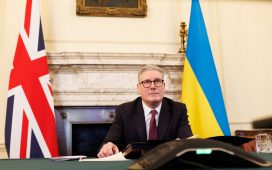Labour is unlikely to rush into proscribing Iran’s Islamic Revolutionary Guards Corps, and will instead examine whether a new category of state-backed terrorism needs to be devised.
David Lammy, the foreign secretary, will also consult colleagues on the implications for Iranian foreign policy of the election at the weekend of a reformist-backed president, Masoud Pezeshkian.
An issue for the west is testing – either through private talks in Oman or more public dialogue – whether Pezeshkian has any real influence on foreign policy and wants to take steps to dial down Iran’s nuclear programme, which would make it possible for sanctions to be eased.
In opposition, Labour said it would proscribe the IRGC, a step that has caused deep concern in Tehran, with foreign ministry advisers warning that such a decision could have an untold damaging impact on UK-Iran relations.
The IRGC is an arm of the Iranian state, and it would be a major precedent for the UK to proscribe part of another state on the basis that it is involved in terrorist acts.
Speaking to the Guardian at the weekend, Lammy said: “We recognise there are real challenges from state-sponsored terrorist activity, and I want to look closely at those issues, and how the predecessor system works for states, as well as for specific terrorist organisations.”
His aides say he is examining a possible amendment to existing laws to allow the government to put targeted proscription-style restrictions on the operations of state-linked organisations such as the IRGC. But this might take time to develop, and the Labour manifesto referred to a possible new regime for state-sponsored terrorism without identifying the IRGC.
David Cameron, Lammy’s predecessor as foreign secretary, withstood wide parliamentary pressure to proscribe the IRGC, arguing such a step could mean Tehran cutting off diplomatic relations with the UK, something Lord Cameron was reluctant to do since he valued the direct, if often angry, conversations with the then Iranian foreign minister.
On the election of Pezeshkian, Lammy said: “I’ve seen the development over the last 24 hours. I want to speak to other colleagues about that and what that really means on the ground, I think it’s a little bit early to say.”
Many Iranian experts disagree about the extent to which the president can influence the direction of foreign policy, or whether ultimately major strategic decisions are reserved by those around the supreme leader, Ayatollah Ali Khamenei.
In a sign that Iran’s overall outlook will initially change only at the margins, Pezeskhian sent a letter to Hassan Nasrallah, the secretary general of the Iran-backed Hezbollah group, saying he was confident that the resistance movements in the region would “not allow [Israel] to continue its warmongering and criminal policies against the oppressed people of Palestine and other nations of the region”.
He also told the Russian president, Vladimir Putin, that Iran was ready to sign a delayed comprehensive cooperation agreement with Moscow.
There is speculation Abbas Araghchi will be the foreign minister in the new government. He worked as the deputy to the former foreign minister Javad Zarif, who acted as Pezeshkian’s campaign aide.
after newsletter promotion
On Monday Lammy met the Canadian foreign minister, Mélanie Joly, in London, the first foreign minister to meet him in the capital since his appointment. Last month Canada announced it would proscribe the IRGC. It had also proscribed the IRGC’s overseas arm, the al-Quds force.
Ottawa already has no diplomatic relations with Iran, so the sacrifice is not comparable to the step the UK would take.
The effect of proscription is that members and supporters, both moral and financial, are criminally liable if they help a proscribed organisation. In a paper last year Jonathan Hall, the UK’s adviser on terrorism law, argued the effect of proscribing the IRGC would be to accept, contrary to the UK’s longstanding policy position, that state forces and therefore states can be “concerned in terrorism” within the Terrorism Act 2000.
He suggested the 2000 law might then need amending to make it legitimate for states to use force in line with humanitarian law.












